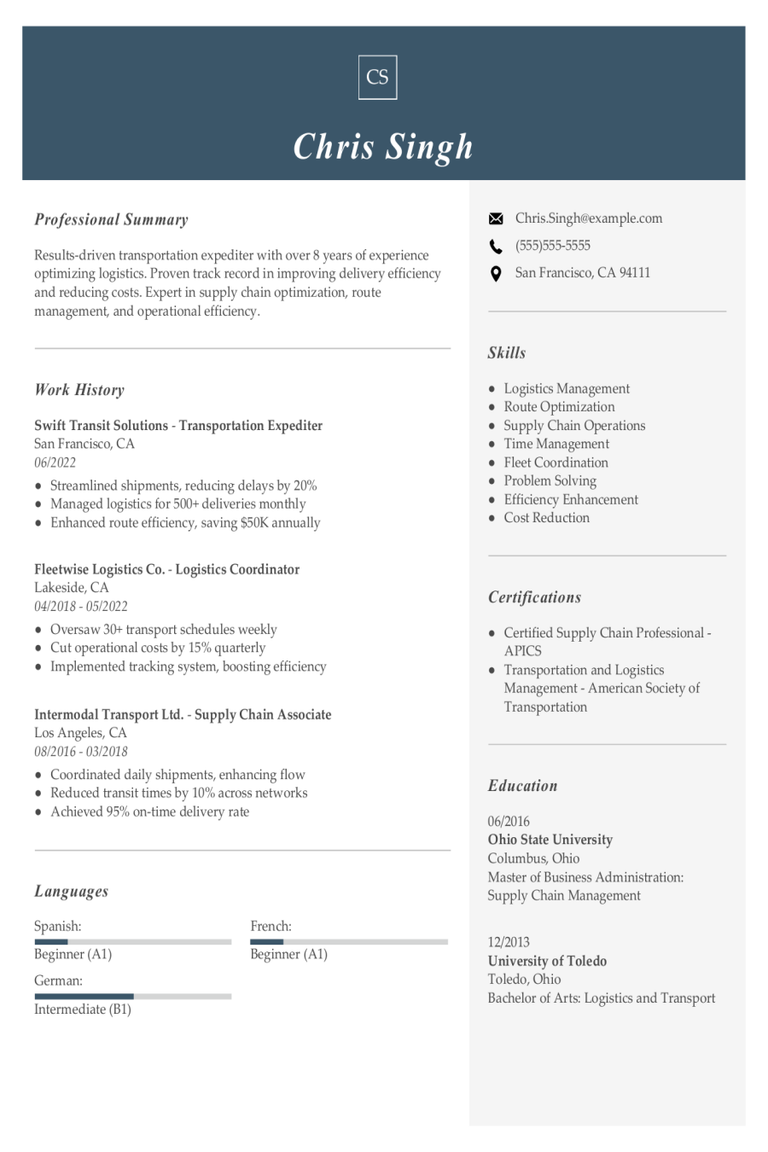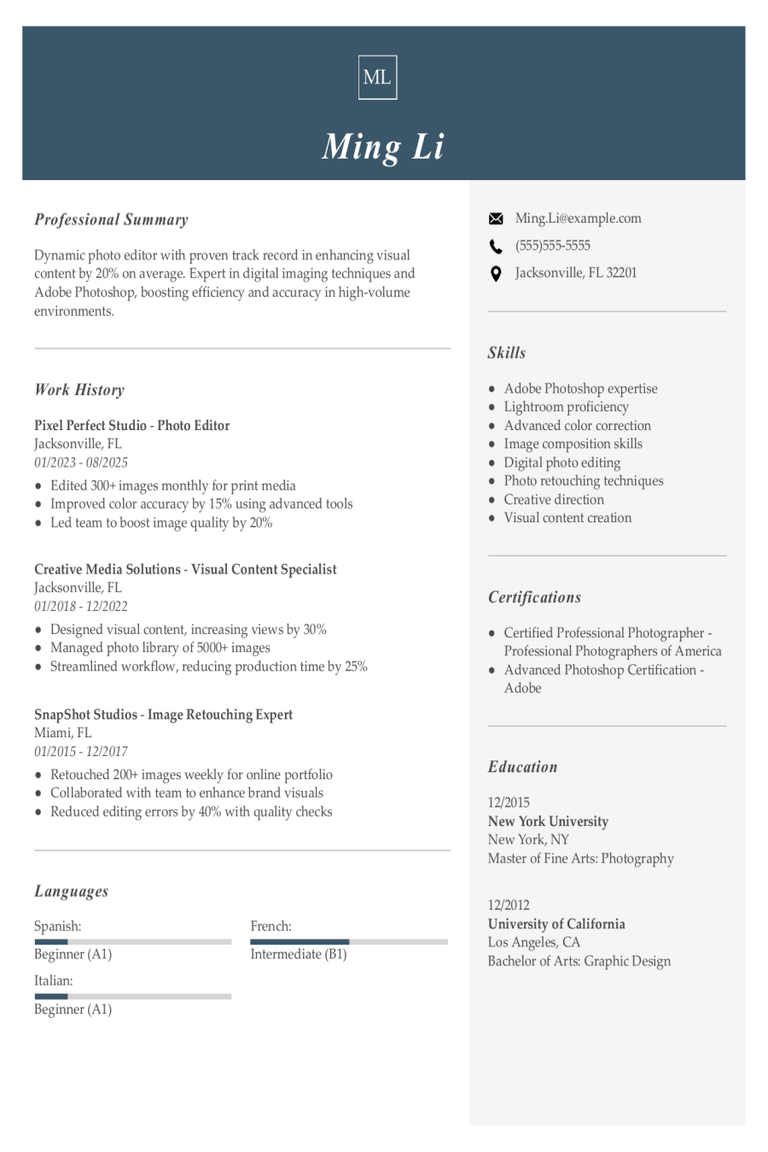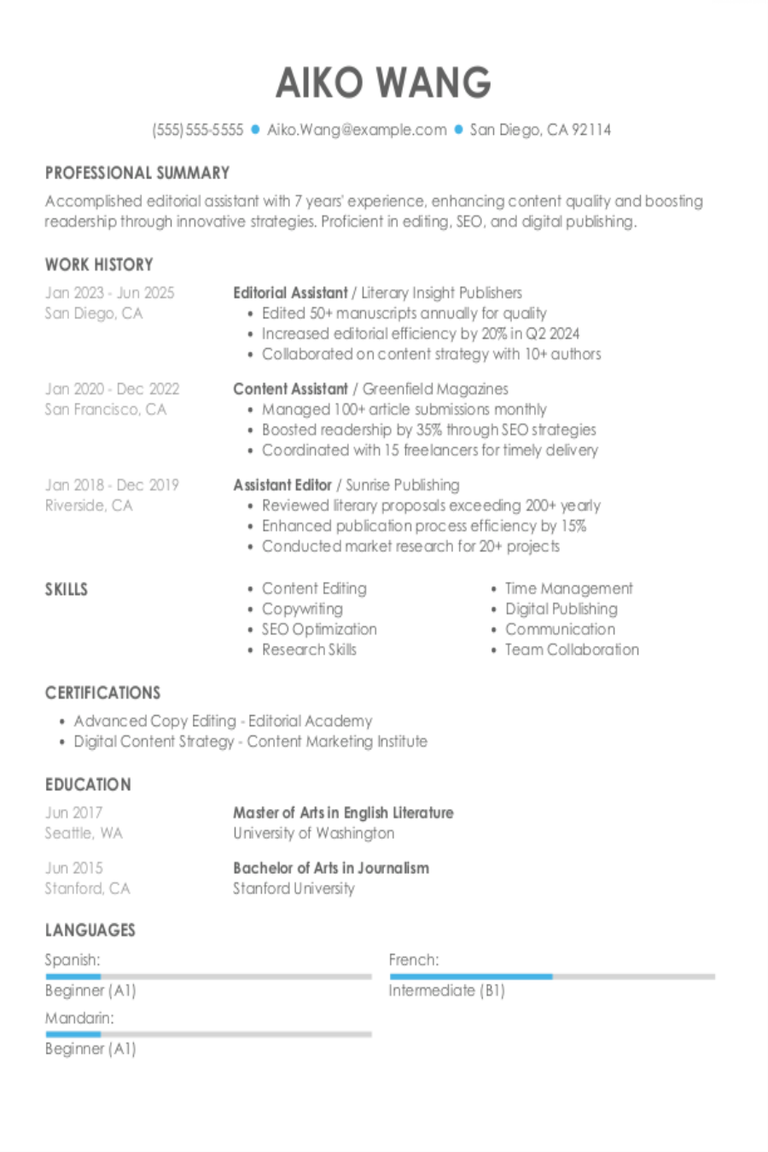Table of Contents
Get started with MyPerfectResume today!
- Build a resume on any device
- Pick an ATS-friendly template
- Tailor with AI copy suggestions
Why this resume works
- Quantifies accomplishments: By showing quantifiable accomplishments like editing over 20 publications monthly and reducing errors by 30% annually, the applicant clearly illustrates their impactful contributions.
- Showcases career progression: Progressing from an editorial assistant to editor, this candidate showcases career advancement through improved responsibilities like supervising junior editors and leading content management.
- Uses action-oriented language: Using action verbs such as “edited,” “boosted,” and “collaborated” effectively conveys a proactive approach to their work.
More Editor Resume Examples
Browse these editor resume examples to learn how to highlight your editing skills, attention to detail, and relevant experience. Use these samples as a guide to build a compelling resume that impresses employers.
Entry-level editor
Why this resume works
- Effective use of keywords: Including industry-specific keywords like “SEO-focused content plans” and “streamlined workflows” optimizes the resume for ATS filters.
- Puts skills at the forefront: By placing skills like “copy editing” and “content strategy” at the top, the resume employs a skills-based resume format to quickly catch a recruiter’s eye.
- Shows digital literacy: Integrating new tools to improve content production efficiency reflects the applicant’s computer skills, demonstrating readiness for tech-driven publishing environments.
Mid-level editor
Why this resume works
- Points to measurable outcomes: Quantifiable outcomes like boosting efficiency by 25% and achieving a 98% on-time delivery rate illustrate a knack for impactful editorial leadership.
- Sections are well-organized: Effective use of bullet points and headers makes the resume easy to scan, ensuring key achievements are quickly accessible and improving readability.
- Includes a mix of soft and hard skills: Combining SEO expertise with interpersonal skills, the applicant shows adeptness at managing teams while optimizing content strategies.
Experienced editor
Why this resume works
- Focuses on work history: Using a chronological resume, the applicant’s detailed career journey showcases significant editorial roles, emphasizing growth and contributions in publishing over the years.
- Showcases impressive accomplishments: Achieving a 50% engagement boost from published reviews indicates impressive accomplishments, showcasing senior-level impact and strategic thinking.
- Lists relevant certifications: Certifications like Certified Professional Editor from Editorial Freelancers Association highlight dedication to expertise development, reinforcing industry knowledge.
Editor Resume Template (Text Version)
Jane Huang
Eastside, WA 98001
(555)555-5555
Jane.Huang@example.com
Professional Summary
Accomplished editor with 6 years in top-tier content editing, project leadership, and team development. Expertise in SEO optimization and content strategy development for digital growth.
Skills
- Content Editing
- SEO Optimization
- Team Leadership
- Project Management
- Content Strategy
- Communication
- Copywriting
- Editorial Planning
Certifications
- Advanced Editorial Certification – National Editors Guild
- SEO Expert Certification – SEO Institute
Education
Master of Arts Journalism
Columbia University New York, NY
June 2019
Bachelor of Arts English Literature
University of Southern California Los Angeles, CA
June 2017
Work History
Editor
Precision Editing Hub – Eastside, WA
January 2023 – June 2025
- Edited content for 20+ publications monthly.
- Reduced editorial errors by 30% annually.
- Supervised a team of 5 junior editors.
Content Specialist
Creative Content Inc. – Tacoma, WA
January 2020 – December 2022
- Managed content for a top-tier online platform.
- Boosted web traffic by 15% within a year.
- Collaborated on a 0K project launch.
Editorial Assistant
Literary Ventures – Tacoma, WA
January 2019 – December 2019
- Assisted in editorial review for 50+ publications.
- Facilitated author-editor correspondence.
- Organized monthly editorial meetings.
Languages
- Spanish – Beginner (A1)
- French – Beginner (A1)
- German – Intermediate (B1)
Related Resume Guides
Advice for Writing Your Editor Resume
Learn to craft a resume for an editor position and discover how to highlight your knack for storytelling, attention to detail, and flair for language. Whether you’re aiming to edit the next bestseller or polish up articles for a leading publication, we’ve got tips to help you stand out. Ready to refine your resume? Check out how to write a resume and start showcasing your editorial prowess today!

Showcase your portfolio or projects
For an editor, showcasing a portfolio or projects is important because it highlights your skills and style. An online portfolio on platforms like Behance, Dribbble, or a personal website can display your best work to potential employers.
Including a link to your portfolio in your resume makes it easy for hiring managers to see examples of your editing work. This is especially important because editing is a creative role where the quality of your work can speak louder than words.
As for adding projects to your resume, structure them like job entries. Start with the project name and mention the client or company if there was one. Give a brief description of what the project was about and then highlight your key contributions and the impact you made.
For example, if you edited a magazine article that increased readership by 20%, make sure to note that. Don’t forget that freelance work, academic projects, and side projects count too. They show that you’ve been practicing and refining your skills outside of traditional employment settings.
Emphasizing these details helps paint a complete picture of how you approach editing tasks and deliver results. It allows employers to see not just what you’ve done but how well you’ve done it.
Example of a projects section
Editorial Content Development for Lifestyle Magazine
Urban Threads Magazine
March 2022 – August 2022
- Conceptualized and wrote feature articles that boosted readership engagement by 30%.
- Coordinated with photographers and designers to ensure cohesive visual storytelling.
- Implemented SEO strategies that increased online visibility and readership.
Digital Content Strategy for Nonprofit Organization
GreenFuture Initiative
October 2021 – February 2022
- Developed a content calendar aligning with key environmental campaigns.
- Edited video content for social media platforms, improving audience interaction.
- Collaborated with the communications team to produce compelling narrative pieces.
Need help writing your resume? Check out these professional resume examples to see how others show off their skills and work history.
Emphasize your most relevant skills
In the role of an editor, both technical and soft skills are key to success. Technical skills include knowing how to use editing software and tools effectively. It’s also important to be good at storytelling and have a keen eye for detail.
On the other hand, soft skills like communication, creativity, and time management help you work well with others and meet deadlines. Together, these skills make sure that content is polished and engaging.
Consider adding a skills section to your resume that lists both your software knowledge and creative talents. This can include everything from Adobe Creative Suite expertise to strong writing and research abilities. By clearly presenting these skills, you show potential employers that you have a balanced skill set suited for an editor.
When describing your past work experiences, weave these skills into your bullet points for more impact. Instead of just listing tasks you’ve done, explain how your editing software know-how helped improve a project or how your communication skills led to successful teamwork on a tight deadline. This approach not only highlights what you’ve accomplished but also shows how your skills make you an effective editor.
For editors, a resume format that highlights language skills, attention to detail, and successful projects can improve your application.
Choose a professional resume template
When selecting a resume template for an editor role, opt for one that highlights your skills without being overly decorative. A clean, well-structured design works best because it allows employers to quickly spot the key details they’re looking for.
Focus on templates with clear headings and sections, using white space effectively to guide the reader through your work history, skills, and experience.
It’s also wise to choose a format optimized for applicant tracking systems (ATS). Many companies rely on these systems to filter resumes before they reach a hiring manager. A simple layout with standard fonts and no intricate graphics or columns increases your chances of getting through ATS.
While eye-catching designs might seem appealing, a straightforward approach is often more successful when applying for an editor position. Let your writing samples or portfolio showcase your creativity instead; keep your resume focused on clarity and readability.
Easily create a standout resume with our Resume Builder that offers tailored templates and tips to highlight your editing skills!
Format your resume properly
Proper resume format is key for readability and a professional look. As an editor, use a chronological resume to highlight your experience in reverse order, showcasing your steady career progression. This format helps emphasize your expertise and growth in editing roles over time, making it clear to employers that you have the necessary background for the job.
5 resume formatting tips
- Use consistent fonts: Opt for fonts like Arial or Calibri, keeping sizes between 10-12 points.
- Highlight sections with headings: Structure with clear headings: “Work Experience,” Skills,” “Portfolio.”
- Use bullet points: Make details scannable by using bullet points for tasks and achievements.
- Limit to one page if applicable: Keep resumes to one page unless you have extensive experience.
- Ensure proper spacing and alignment: Maintain uniform margins and spacing for a clean, professional appearance.
Don’t let ATS software reject your resume! Our ATS Resume Checker makes sure your resume has the right format and keywords to get noticed.
Salary Insights for Editors
Knowing salary data can guide you in choosing the best career path or deciding where to move. The U.S. Bureau of Labor Statistics offers helpful information so you can plan ahead. More details are provided below.
Top 10 highest-paying states for editors
Editors earn varying salaries across the United States, with a national average of $65,624. The table below highlights the states where editors command the highest compensation.
Our salary information comes from the U.S. Bureau of Labor Statistics’ Occupational Employment and Wage Statistics survey. This official government data provides the most comprehensive and reliable salary information for writers across all 50 states and the District of Columbia. The figures presented here reflect the May 2025 dataset, which is the most recent available as of this publication.
| State | Average Salary |
|---|---|
| New York | $110,080 |
| California | $99,050 |
| District of Columbia | $93,600 |
| New Jersey | $92,490 |
| Massachusetts | $89,710 |
| Maryland | $85,380 |
| Delaware | $84,180 |
| Virginia | $81,490 |
| Washington | $77,990 |
| Oregon | $77,930 |
FAQ
Do I need to include a cover letter with my editor resume?
Yes, including a cover letter with your editor resume can make you stand out to potential employers.
It gives you the chance to show your passion for the role and share relevant editing experience, like your knowledge of various writing styles or genres.
For example, if the publishing company focuses on specific content—such as scientific journals or lifestyle magazines—you could discuss any skills or experiences related to that area.
You might want to try tools like our Cover Letter Generator to build a personalized cover letter that pairs well with your resume, offering easy-to-follow steps and expert advice along the way.
Also, browsing through our collection of cover letter examples or this tailored editor cover letter can help inspire letters for various editorial roles.
How long should a editor’s resume be?
For an editor, a concise one-page resume is usually enough to highlight your key skills and experiences effectively. Emphasize your editing expertise, familiarity with industry software, and any notable projects or publications you’ve contributed to.
If you have significant experience or specialized credentials like certifications in advanced editing techniques or leadership roles in major publishing projects, a two-page resume might be the better choice. Just make sure every detail ties back to the editing field to keep it engaging.
To figure out how long a resume should be, check out our guide for tailored tips and examples based on your career stage.
How do you write a editor resume with no experience?
If you’re aiming for an editor position but lack experience, focus your resume on skills, education, and activities that showcase your potential. To create a competitive resume with no experience, follow these tips:
- Focus on education: List your degree first, especially if it’s related to English, journalism, or communications. Mention key coursework like editing, writing, and literature studies.
- Highlight relevant projects: Include any school projects, freelance work or personal blogs where you’ve edited content. Detail what you did and the impact it had.
- Showcase transferable skills: Emphasize skills such as attention to detail, strong grammar knowledge, time management, and skill with editing tools like Microsoft Word or Google Docs.
- Include internships or volunteer work: If you’ve volunteered for a student newspaper or interned at a publishing house, describe your responsibilities and what you learned from those experiences.
- Add a strong objective statement: Write a brief statement at the top of your resume summarizing your passion for editing and eagerness to contribute to a team.
Check out more resources on crafting resumes without experience for further tips and templates tailored to entry-level editors.
Rate this article
Editor
Share this page
Additional Resources

Transportation Expeditor Resume Examples & Templates
As a transportation expeditor, your resume must show how you organize shipments, track deliveries, and solve problems when delays happen. Use our resume examples and tips to effectively highlight your

Photo Editor Resume Examples & Templates
Explore photo editor resume examples and tips that help you spotlight your artistic skills and experience in making photos look their best.Build my resumeImport existing resumeCustomize this templateWhy this resume

Video Editor Resume Examples & Templates
Discover video editor resumes examples and tips to learn how to showcase you cut and arrange footage, add effects, and create engaging stories.Build my resumeImport existing resumeCustomize this templateWhy

Editorial Assistant Resume Examples & Templates
Look through editorial assistant resume examples that focus on organizing content and supporting publishing goals. Use our tips and examples to effectively spotlight your strong editorial skill set.Build my resumeImport

Editor Cover Letter Example + Tips
Reviewing the free editor cover letter sample, you can see some of the techniques that you should incorporate as you write. Show your personality and how both your experience and

The Illusion of Wage Growth: Where Paychecks Stretch the Farthest
U.S. wages have climbed at one of the fastest rates in modern history. Between 2020 and 2024, the average American worker’s pay rose from about $64,000 to $75,600, an 18%
